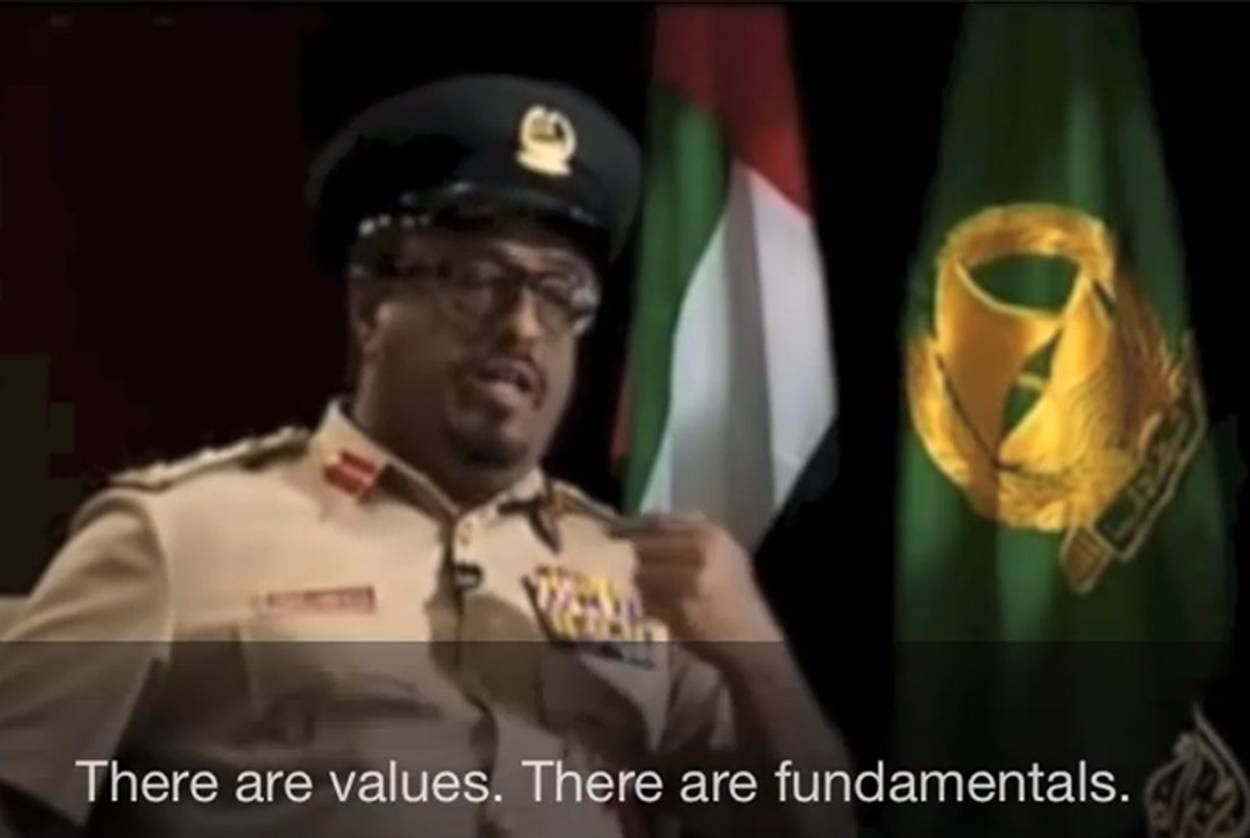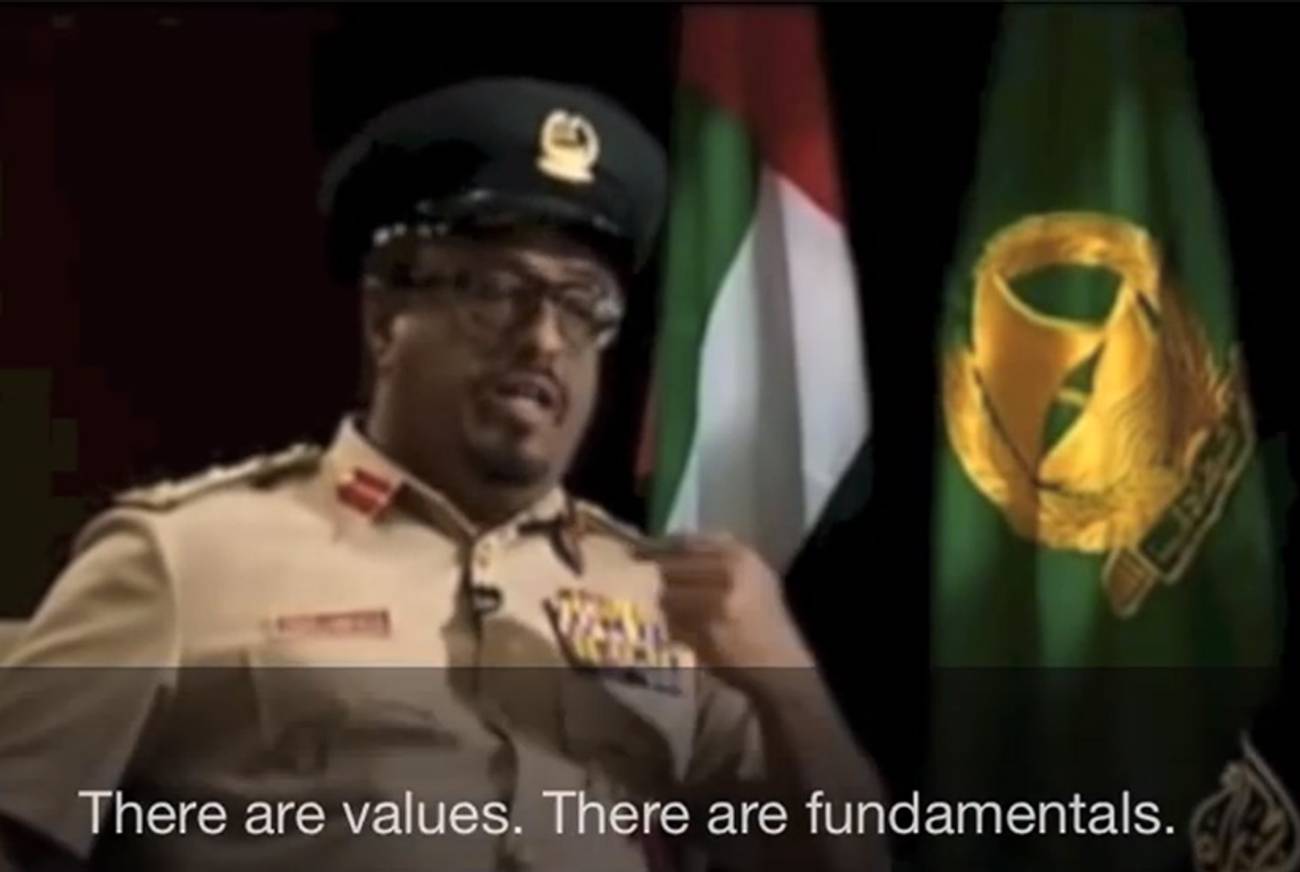Former Dubai Police Chief Was a Hero in the Arab World Until He Said He’d Help Israel
After the 2010 Hamas hit, Lt. Dhahi Khalfan Tamim denounced Mossad—but said it was his duty to warn of terror plots in Tel Aviv




The January 2010 assassination in Dubai of Mahmoud al-Mabhouh, a cofounder of the military wing of Hamas, briefly drew international attention to the man who went on to investigate it: Lt. Gen. Dhahi Khalfan Tamim, Dubai’s long-serving chief of police. Within a few weeks, he had identified 29 suspected hit-squad members, issued international warrants for their arrest, and released their photographs to the public—along with video footage of their movements before and after the killing. Pinning responsibility for the operation on Israel’s Mossad, Tamim also called for the arrest of Prime Minister Benjamin Netanyahu and Mossad chief Meir Dagan.
Tamim became a folk hero in the Arab world for publicly embarrassing the Mossad—which is why many Arabs were surprised, a year and a half later, to see Tamim declare that he would not hesitate to relay intelligence to Israel to help thwart terror attacks on its soil. In a September 2011 interview on Al Jazeera, he told a reporter, “Rest assured: If I know that a bomb is going to go off on a street in Israel, I’ll take the same security measures to protect the safety of a Jewish person as I’d do for someone anywhere in the land of Islam.” The journalist raised a series of objections, but Tamim refused to back down. The clip spread virally on YouTube and via social media, with a legion of angry viewers dubbing Tamim a “Zionist collaborator” and a “traitor”—and prompting a few to call for his death. (I’ve posted a portion of the interview, with subtitles, to YouTube.)
Is Tamim—who retired from his post in November—an enemy of Israel as many Arabs once thought, or a friend to Israel as some later came to believe? The answer, judging from his public statements as well as assessments of his work by international security organizations, is that he is neither—but rather a principled advocate for the values of state sovereignty and egalitarian policing. In parts of the Arab region today, proponents of these ideas are on the defensive. Among the reasons for this is the influence of reactionary elements within Arabic media that are unwilling or unable to grapple with the values Tamim espouses—and their response, in turn, illuminates some of the challenges Western policymakers face when dealing in the region.
***
Viewers of the interview clip will notice at the outset, from the cadence of Tamim’s comment on reporting a terror threat to Israeli officials, that he is not calling for a thaw in relations with Israel. Rather, he is setting up a rhetorical device: So important is the virtue of seamless international policing, he explains in substance, that even the Jewish state cannot be excluded from the design; start making exceptions for one country or denomination and eventually the entire global security edifice will collapse.
It shouldn’t be too hard for a Middle Eastern journalist to grasp the relevance of Tamim’s point at a time of sectarian bloodletting in Syria, Iraq, and elsewhere—but Tamim’s interviewer, Al Jazeera’s Elsy Abi Asi, failed to do so. At first she plausibly played devil’s advocate: “[T]hat’s dangerous talk, Lt. Dhahi,” she said. “Many people would disagree with you.” Tamim, now in his sixties, responded with indifference—and, in fact, upped the ante. He would inform Israel of the threat, he said, “By God if it were in the heart of Tel Aviv.” Though he went on to explain that he did not have a relationship with Israeli officials, he said he would “break the rules to save a life, even if he’s Jewish.” A security officer, he added, “should not consider a person’s color, religion, nationality, or any other distinguishing factor.”
In response, Abi Asi pointed out that Arabs have a problem with Israel “over a major issue in the Arab world”—referring, of course, to the Israeli-Palestinian conflict. Tamim replied, “That’s something else. That’s a separate matter.” Abi Asi asked Tamim whether he thought Israelis would do the same to help save Arab innocents if the tables were turned. “If the Israeli officer’s morals weren’t the same,” Tamim replied, “that would not be a reason for me to be immoral like him.”
“Why not?” she asked. “Why don’t we treat him similarly?”
It is worth pausing to reflect on Abi Asi’s question. She shifted her locution to the first person plural—“Why don’t we treat him similarly”—as if she and Tamim were on the same vice squad, or bound together in some collective conscience whose morals she presumes to defend. And the moral for which she was advocating was one that says that if an Arab cop happens to learn about an imminent terror attack in Israel, he should sit on the information and let the atrocity take place.
“No!” Tamim replied. “There are values. There are fundamentals.” And, he added, he was sworn to uphold those values as a “security man from this region who is also a pure Muslim.”
Name an ugly epithet in Arabic and you will probably find it beside Tamim’s name among dozens of repostings of the Al Jazeera clip on YouTube. Some of them also splice in Qur’anic verses, which are used to imply that Tamim is an “infidel,” worthy of execution. Others spell out the ideological objections that clearly informed Abi Asi’s line of questioning—in particular, the view that there is no such thing as an “innocent” in Israel.
The dynamic between Abi Asi and Tamim illustrates a dilemma to Westerners as they formulate policies toward the Arab world. The public discussion of Arab security services in the United States is primarily concerned with human rights abuses and the question of how to balance the advancement of human rights with the protection of American political and economic interests. Meanwhile, discussions of Arabic media are largely framed in terms of media freedom: What can be done to fight censorship in the Arab world? What tools should be provided to Arab journalists to help them afflict the comfortable and comfort the afflicted?
So, imagine that you are Lt. Gen. Tamim attempting to understand what America stands for in his region. You make a serious effort to comply with international police protocols on human trafficking, counterterrorism, the drug war, and indeed human rights conventions. You take a stand in the Arab public discussion in support of egalitarian policing—“even in the heart of Tel Aviv”—and accept the opprobrium. Yet much of what you experience from the United States is public pressure, in the form of government and nongovernment human rights reports that you believe to be unbalanced. Your comment about protecting Israeli civilians goes untranslated and unreported in the United States—even by pro-Israel groups that monitor Arabic media—and meanwhile, many American liberals fete Al Jazeera as a bastion of progress.
This is the context in which Tamim lambasted America, at a conference of Arab security officers in April 2013, as “the number one threat to security in the Gulf.” He told the audience that “Americans don’t have a friend because they quickly turn on their friends.” He said American policy calls for “exporting revolution” to the Arab world. He criticized Washington for enabling Iran to establish a powerful presence in Iraq. He rejected “what Americans think” about Iran’s “peaceful nuclear aspirations.” And of course, he denounced Washington for “neglecting the human rights of the Palestinian people.”
Unmentioned in the video, probably because it cuts off in the middle of the speech, is the other principal bone of contention between Tamim and Washington: policies toward the Muslim Brotherhood. Tamim is arguably the most strident critic of the Brotherhood in the Arab world today. Among his main objections to the movement is that it wants, in his view, to undermine the international system of inviolable sovereign states—a system he relentlessly upholds, from Mabhouh to Elsy Abi Asi—and replace it with a Brotherhood “caliphate.” Accordingly, from his perspective, the Obama Administration was wrong to abandon former Egyptian President Hosni Mubarak; wrong to engage his successor, Brotherhood stalwart Mohammad Morsi; and wrong now in applying pressure on Egypt’s present government to grant the Brotherhood a seat at the table of power. Journalist Elsy Abi Asi’s network, Al Jazeera, is widely perceived in the region to be a booster of the Brotherhood too. For Tamim, the support the network has long enjoyed in certain American quarters must be somehow of a piece with the indulgence of the Brotherhood by the same people.
A more sophisticated American discussion is called for in matters relating to Arab security services as well as Arabic media. We should condemn those practices and communications to which we object, but also acknowledge and encourage those that deserve praise. The complexity of doing so is further illustrated by the fact that in January 2013, Tamim tweeted a series of links advancing the predictable canard—in vogue across the Arab world these days—that the Brotherhood is so bad it must be a Jewish creation. On Feb. 1, 2013, the Anti-Defamation League issued a statement denouncing the Twitter campaign.
But it is wrong and self-defeating to make noise about what is odious but say nothing about what merits commendation. To modestly advance this principle, I have added a note to the YouTube clip urging supporters of Tamim’s remark on egalitarian policing to tweet their approval. He has taken plenty of flak for it already.
***
Like this article? Sign up for our Daily Digest to get Tablet Magazine’s new content in your inbox each morning.
Joseph Braude is an author, broadcaster, and Middle East specialist. He is working on a book about Arabic media.
Joseph Braude is an author, broadcaster, and Middle East specialist. He is working on a book about Arabic media.